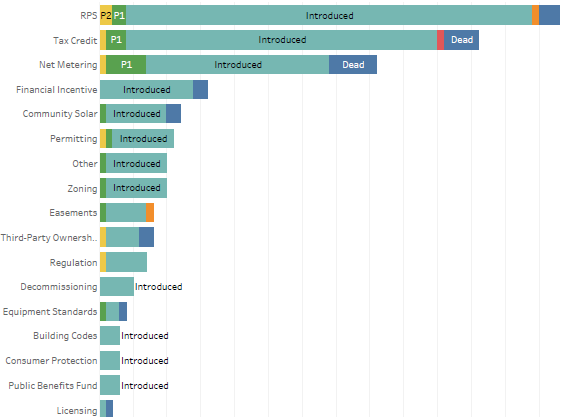No products in the cart.
Renewable Energy Bills at State Level Help Push Climate Action
Despite the recent news of President Trump un-doing climate change policies at the federal level, state legislatures across the country are making it clear where they stand on clean energy issues. According to the Database of State Incentives for Renewables and Efficiency (DSIRE), almost 300 bills about renewable energy have been introduced this year at the state level.
If you’re looking to join the clean energy workforce and meet the demand for solar energy in your state, visit our Getting Started With Solar series to gain information on how to get started.
Find Solar Incentive Programs in Your State
Established in 1995, DSIRE is a comprehensive resource with information on incentives and policies that support renewable energy and energy efficiency in the United States. The database is maintained by the NC Clean Energy Technology Center at NC State University and funded by the U.S. Department of Energy.
On the DSIRE website, you’ll be able to find energy efficiency rebates and incentive programs by state. These types of opportunities highly encourage home energy professionals and contractors to pursue energy auditor certifications and solar panel installation credentials. With these qualifications, professionals can meet the demand for energy improvement in their state and receive monetary kick-backs from the work.
States Show Support for Climate Change Policies
DSIRE tracks bills in three categories
- Renewable energy
- Energy efficiency
- Advanced grid technologies
As we noted above, there have been 300 bills pertaining to renewable energy in one form or another. This category has shown the most activity this year.

So far, Northeastern states have demonstrated the most clean energy legislation proposed – specifically in New York and Massachusetts. State legislatures operate according to their own schedules, so we may see more activity in the coming weeks.
DSIRE notes that few bills have made it through the full legislative process, whether success or not. Most of the bills being tracked have just been introduced; a few have already “died,” and even fewer have been passed by one or both chambers.
Setting Renewable Energy Goals with RPS
The most common type of renewable energy policy being introduced in these bills has to do with state renewable portfolio standards, or RPS. These standards require utilities to sell a specified percentage or amount of renewable electricity.
States with Aggressive RPS Targets Over Longer Timeframes
- Massachusetts – multiple RPS bills would set a 100% renewable target
- Hawaii – legislation seeks to create a strategic plan for achieving the state’s already existing 100% target
- Vermont – has a bill to create a 90% target by 2020
Legislation with Short-Term Goals
- Massachusetts – has a proposed bill setting a 40% RPS target to be reached by 2030
- New York – has a proposed bill that would set a 37.5% target for 2023
- Minnesota & Nevada – have proposed bills setting a 50% target for 2030
Enacted
- Maryland – enacted a bill this year increasing its RPS to 25% by 2020
States with Slowed Support
- North Carolina – proposed legislation aimed to make RSP targets less aggressive
- Ohio – wants to make the targets voluntary
- New Hampshire – wants to repeal the standards altogether
States Debating Eligible Types of Renewable Energy to Include in the RPS
- Oregon & Washington – looking at hydroelectric power sources
- New Mexico – proposed a bill that would make nuclear energy an eligible source
If you’d like to follow energy efficiency and renewable energy incentives in your state, DSIRE has an option for you to subscribe to its quarterly newsletter. Visit the About Us page on the DSIRE website and submit your contact information to join the email list.
This is all positive news for those of us who care about climate change and clean energy alternatives. Although the federal energy policy gets a lot of media coverage and attention, perhaps we can get excited about all the advocacy and support at the state level.
DSIRE is probably the best resource out there for finding energy-related policies and industry drivers by state. If you’re looking to take your career in that direction and acquire skills relevant to the clean energy workforce, Everblue is your training resource.
Much of our solar training is available online (self-paced) for your convenience. We also offer in-person solar panel installation courses. For more information, call us at (800) 460-2575 or browse our solar training courses online.